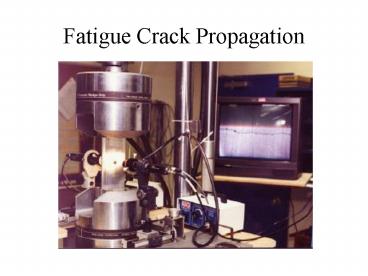Fatigue Crack Propagation - PowerPoint PPT Presentation
1 / 24
Title:
Fatigue Crack Propagation
Description:
A fatigue crack 1.5 mm long has been discovered in a main wing spar of a CC-130 ... Section A-A Through Spar (inches) Crack. a. Loading. time. 100 cycles=1 ... – PowerPoint PPT presentation
Number of Views:1920
Avg rating:3.0/5.0
Title: Fatigue Crack Propagation
1
Fatigue Crack Propagation
2
Fatigue Crack Growth
- Once a crack is present in a material, it will
tend to grow under the influence of cyclic
loading. - The crack may be initiated by fatigue, or may be
pre-existing from manufacture, or may be caused
by an impact, or similar event (e.g., a thermal
shock.) - The crack will grow to a critical length then
fracture of the component will occur.
3
Driving Force for Crack Growth
- The driving force for crack growth is the range
in the stress intensity factor during cycling.
4
Cyclic Loading
Rotating Machinery
Airframes, Bridges, Tanks, etc,
5
Crack Growth Rate, da/dN
Ds1
Ds1 lt Ds2
ac1
X
Ds2
X
ac2
Crack Length, a
da/dN2
da/dN1
ao
Cycles, N
6
Paris Law
Paris Region Stable Growth
Threshold Region Slow Growth
log(da/dN)
m
Fast Fracture Region Rapid-unstable Growth
A
log(DK)
7
Crack Growth Rates and Microstructural Features
8
Fractographic Evidence of Crack Growth
fatigue striations
10 mm
9
Fatigue Striations in Al-alloy 5 small
cycles between overloads
Crack Growth direction
10
Crack Growth Mechanisms
No Load
Load reduced
Slip
Loaded
No Load
Max Load
Loaded again
11
Model for Crack Growth
4
6
2
1
5
7
12
Crack Propagation Life, Np
Total fatigue life is the sum of the crack
initiation life and the crack propagation
(growth) life.
For some components, where stress levels are high
and/or the critical crack size is small, the
crack propagation life is neglected in design.
For other structures, including pressure vessels,
ship structures, transport aircraft, etc. the
crack growth life may be a substantial component
of total life.
13
Limits of Integration
- The initial crack length, ao, is usually either
- found by inspection or a reasonable minimum
- size of crack is assumed for the analysis.
- The critical crack size is found from
- Where smax is the maximum stress.
- (its not the stress range)
14
Procedure for Constant Amplitude Crack Growth
life Calculation
- Obtain appropriate crack growth rate data for
material, environment and stress ratio - Determine starting crack size, ao
- Determine critical crack size, ac
- Determine DK for starting crack size, ao. If DKlt
DKth then crack will not grow - If DKgt DKth then integrate to get crack growth
life. (Can conservatively use Paris Law, if
appropriate)
15
General Paris Law Solution for Np
Special Case m3 f(a/W) constantY
16
General Solution
- A more general solution will include the actual
growth rate data in the threshold and
near-threshold region. - If the starting crack size is relatively small,
this will represent a major portion of growth
life, so it may be un-economical to neglect it. - The life in the fast fracture region is generally
neglected. Use this data carefully.
17
Try it!
- A fatigue crack 1.5 mm long has been discovered
in a main wing spar of a CC-130 Hercules
undergoing structural tear down and inspection.
Given the loading, material and geometry shown,
estimate the number of flying hours to fracture,
and comment on the results.
7075-T73511 al alloy Kc (6mm) 40 MPa?m Sy 455
MPa A 1.3x10-10 m/cycle m 3 Y 1.27 (assume
constant)
18
Wing Spar
Cracks here
DS
19
Section A-A Through Spar (inches)
Crack
a
20
Loading
75
Stress (MPa)
10
0
time
100 cycles1 flying hour
21
OK...
- ao 1.5 mm, find ao
Stress Range, Ds smax-smin (75 - 10) MPa 65
MPa
22
For m3, Y constant
23
Crack Growth Curve
95000 cycles at half length! N/Np 89
5 mm at half life! a/ac 15
24
Comments Observations
- There is a substantial period of crack growth for
this component. The fatigue crack can be
monitored, inspected, and the component can be
replaced or repaired after 500 more hours of
operation. - Half-life (factor of safety on life) is a safer
criterion than length, because cracks grow too
rapidly as they become longer.































